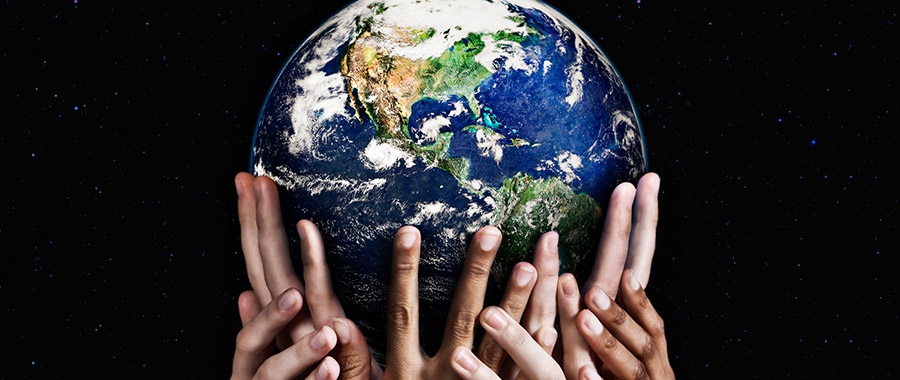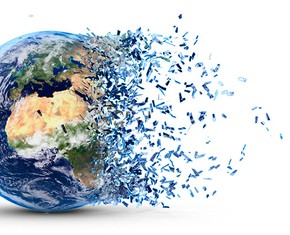The views expressed in our content reflect individual perspectives and do not represent the authoritative views of the Baha'i Faith.
Destructive worldwide processes—the ongoing sixth mass extinction, global pollution, deforestation and climate change—challenge everyone to do something to save the Earth.
But what can we do as individuals?
Well, as a start, we can realize that we’re not “saving the Earth.” This planet has been and will be here for millions of years, regardless of what humanity does. Earth, as the bumper sticker wisdom says, bats last. We do not have the power to destroy the entire planet, although we could certainly deplete its natural resources and befoul its natural environment enough that it would no longer support so many of us—or any of us, for that matter. Ninety percent of all the species that have ever lived on Earth are now extinct. We could, if we continue our present course, join them.
Next, we can begin to understand that what we’re saving isn’t the planet—it’s the people on it. Humanity has set itself on a destructive, greedy, materialistic course, and we need to alter that course before it’s too late. We need to save humankind, not the big spinning ball we all live on.
I know you’ve heard the usual prescriptions for saving humanity and averting a total environmental collapse: change your lightbulbs, make do with less, lower your carbon footprint, use solar power, cut back on materialistic consumerism, etc. Some also encourage nonviolent direct action—local or national political activism, movement-building, demonstrations, civil disobedience and the like.

As important as these things might be, even the most committed environmental activists realize they don’t really come anywhere close to matching the scale of the problems—huge multinational industrial polluters, enormous infrastructures, indifferent leaders and governments, longstanding harmful policies, entire economies based on fossil fuel dependence, and the ultimate rule of money, which make systemic change a daunting and seemingly herculean task. It seems, to many thoughtful people, that present-day institutions, both corporate and governmental, no longer have the ability to avert the calamities that threaten human society.
What, then, do the Baha’i teachings recommend? Here are five specific recommendations for real and lasting change:
1. Institute a global federal government that can regulate the Earth’s resources; with:
… global cooperation of the family of nations in devising and adopting measures designed to preserve the ecological balance this earth was given by its Creator.
Until such time as the nations of the world understand and follow the admonitions of Baha’u’llah to whole-heartedly work together in looking after the best interests of all humankind, and unite in the search for ways and means to meet the many environmental problems besetting our planet, the House of Justice feels that little progress will be made towards their solution …. – The Universal House of Justice, from a letter dated 18 October 1981 to an individual Baha’i.
2. Stop extracting fossil fuels and burning them. Use energy sources only from the surface of the Earth—the sun, the wind, water and the tides:
A world federal system, ruling the whole earth and exercising unchallengeable authority over its unimaginably vast resources, blending and embodying the ideals of both the East and the West, liberated from the curse of war and its miseries, and bent on the exploitation of all the available sources of energy on the surface of the planet, a system in which Force is made the servant of Justice, whose life is sustained by its universal recognition of one God and by its allegiance to one common Revelation—such is the goal towards which humanity, impelled by the unifying forces of life, is moving. – Shoghi Effendi, The World Order of Baha’u’llah, p. 204.
3. Since the world’s militaries expend so much energy for destructive purposes, stop war and disarm and de-militarize the nations:
Now the question of disarmament must be put into practice by all the nations and not only by one or two. Consequently the advocates of Peace must strive day and night, so that the individuals of every country may become peace-loving, public opinion may gain a strong and permanent footing, and day by day the army of International Peace be increased, complete disarmament be realized and the Flag of Universal Conciliation be waving on the summit of the mountains of the earth. – Abdu’l-Baha, Star of the West, Volume 3, p. 116.
4. Institute spiritual solutions to the world’s economic problems, especially by shrinking the great gap between the extremely wealthy and the abject poor, both as individuals and as nations:
There is need of an equalization so that all may have an apportionment in the comforts of life. For example, the wealthy man, whose table is adorned with all kinds of delicacies, must allow the poor to have at least his necessities. It is not right that one should have all the delicacies and all foods on his table when another is in want of the necessities of life. The rich must be merciful to the poor and out of their own willing hearts should they uplift them, they should not be forced. There must be a readjustment and legislation which shall equalize conditions until humankind may have composure and rest with utmost ease. – Ibid., Volume 10, p. 122.
5. Work in a spirit of unity and cooperation with others, locally and globally:
In addition to addressing the [environmental] issue on a fundamental spiritual level, collaboration with individuals and groups interested in improving the environment is encouraged. The Baha’i communities are called upon to make the conservation of the environment an integral part of their ongoing activities by … assisting in endeavours to conserve the environment … – The Universal House of Justice, Message to the Baha’is of the World, April 1989.
Do these things seem lofty, idealistic or impossible? They’re not—we can achieve every one of them, if we unite.
















Comments
Sign in or create an account
Continue with Googleor